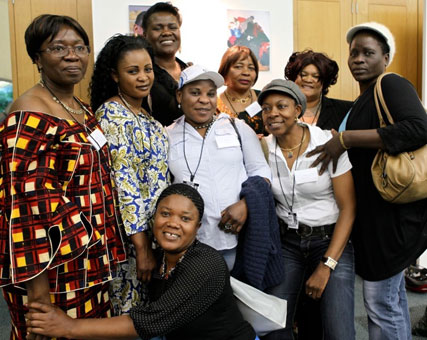
The signs read, “SULMA IS WELCOME HERE”, but for how long, and what is welcome? Ask Sulma Franco, a 31-year-old LGBT activist from Guatemala who has lived in Texas for six years, part of that in San Antonio, much of it in Austin. In Austin, she owned a thriving food truck business, La Ilusión. No longer.
In 2009, Sulma Franco applied for asylum as an open lesbian who faced violence if she returned home. She passed her initial interview with immigration officers, who determined she had a “credible fear” of returning to Guatemala. Released from detention, she was allowed to work. For years, she reported to immigration officers every three months. In June 2014, she was arrested and faced deportation. She says her former attorney failed to file some papers, and so her asylum case ended, abruptly and without her knowledge: “I didn’t have any problems until then. The immigration official said to me, ‘You know what, I want to tell you your case is closed and you’ll be detained.’ As simple as that. My record is clean. I’m not a criminal … I was paying taxes on my business, and was contributing to society. I had a work permit, driver’s license, business permits that were all in my name.”
No one disputes that Sulma Franco, as an open lesbian and prominent LGBT activist, faces peril if she returns to Guatemala. According to a 2012 study, Guatemala is a world leader in “the frequency and severity of violence against women — including lesbians, bisexual women, and transgender (LBT) women”. Sulma Franco already knows this: “The most difficult situation is that I would end up dead. The discrimination, the hate due to my sexual orientation … In my country, these are things that happen because of sexual orientation. That’s why I fear returning. They can’t tolerate the idea that two women can fall in love, have a child, run a business. If I fled this, why would I want to return? Here, I was able to take my girlfriend to a restaurant and have no problems … I don’t want to go back. I’ve suffered enough there. I’ve been discriminated against, abused and beaten up in every form because of my lifestyle … I can be tortured. I can be sexually abused. I can also be killed.”
On June 11, Sulma Franco was given sanctuary in an Austin church. Faith based groups joined immigrant rights organizers and women’s groups to push for a stay in deportation. On Tuesday, August 18, Sulma Franco was granted an order of supervision, which allows her to stay in the United States “for the time being.” Meanwhile, La Ilusión is no more, thanks to months in detention.
The treatment of Sulma Franco is a national disgrace, and it’s far from over. Yet again, for one woman to arrive at a precarious for-the-time-being, hundreds of people have to invest thousands of hours. In a famous scene in The Elephant Man, John Merrick, the protagonist, asks his mentor, “If your mercy is so cruel, what do you have for justice?” His mentor replies, “I am sorry. It is just the way things are.” Sulma Franco knows the way things are: cruel mercy, injustice posing as rule of law, and massive and intensive exploitation of those women who dare to dream. As simple as that.

Sulma Franco
(Photo Credit 1: Mari Hernandez / The Austin Chronicle) (Photo Credit 2: Alberto Martinez / San Antonio Current)


